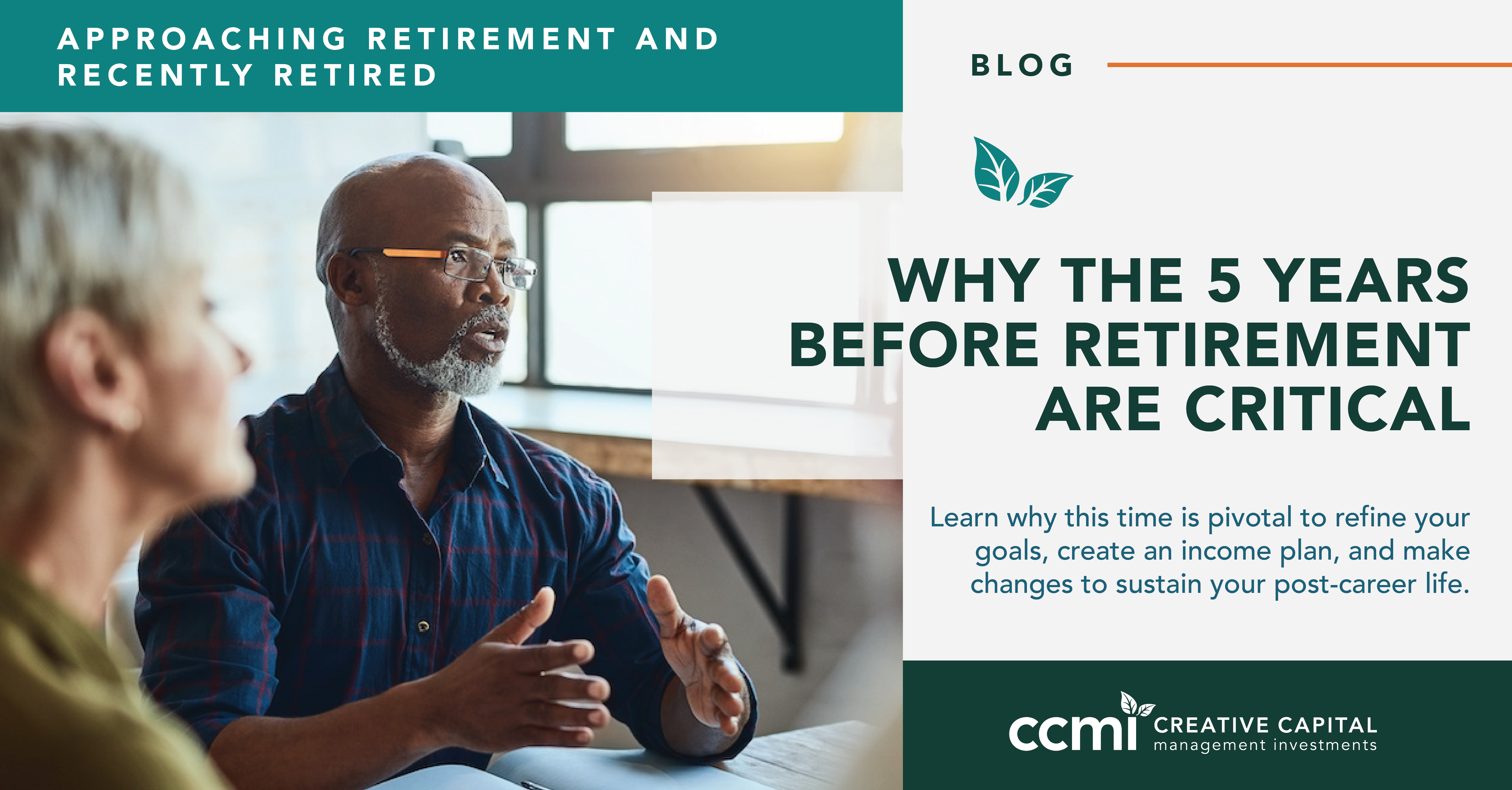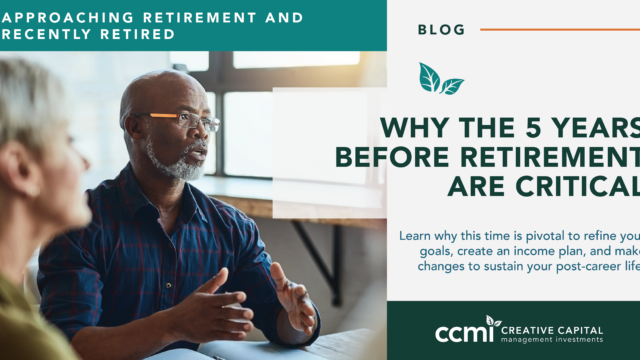If retirement is on the horizon within five years, now is the time to revisit your retirement plan and ensure you’re on track. This period is pivotal to refine your goals, develop an income and budgeting plan, and make necessary changes that sustain you throughout your post-career life. Explore five essential areas as you approach retirement.
What Are Your Anticipated Expenses in Retirement?
Most pre-retirees wonder if they’ll have enough money to retire while maintaining their current lifestyle and pursuing new adventures. A key element in addressing this concern is gaining a clear understanding of anticipated expenses in retirement. With more time to travel and potential health and tax costs, expenses are sometimes higher in retirement. Still, it’s an effective exercise to outline your current and anticipated expenses, considering your goals, to determine how much you’ll need to retire comfortably. Here are a few factors to think about:
- Mortgage Considerations: Do you have a mortgage, and if so, will payments extend into your retirement?
- Dependents: Do you have or will you have dependents in retirement? While you may not have children to support, you may have additional expenses if you plan to care for or move closer to an aging parent.
- Location: Your expenses may change depending on where you retire. For example, additional expenses may exist if you plan to retire in San Diego, a highly sought-after and costly destination for many retirees.
- Additional Activities: What extra costs do you anticipate, such as those related to travel and entertainment? Outline your ideal retirement picture to determine how often you’d like to travel or pursue other fun activities to integrate them into your overall expenses and plan.
Consider How Expenses Will Change in Retirement
You should also consider how your expenses evolve throughout your retirement. For example, as you age and slow down physically, you may travel less but need more medical support.
Work with a financial advisor who can help walk you through hypothetical spending scenarios based on age, health, and projected income.
How Will You Pay for Healthcare in Retirement?
Alongside your regular expenses, you should also factor in costs related to health coverage and unanticipated medical events.
Retiring Before Age 65
Insurance coverage is a particularly significant consideration if you plan to retire before age 65 since you are ineligible for Medicare. Five years from retirement is the time to think about how you will insure yourself or others. You may consider:
- Private Insurance: Explore and compare individual health plans
- Employer Benefits: Review any retirement healthcare benefits offered through your employer
- Spousal Coverage: Consider benefits through your spouse’s plan
It’s also an excellent time to familiarize yourself with Medicare, the federal health insurance program for individuals 65 and over. A professional can help guide you through the different components of the program, what they cover, and how premiums are affected so you’re well-informed when you become eligible.
Unanticipated Medical Costs
Ensure you have a plan for unforeseen medical injuries and procedures or a catastrophic medical event for yourself, your spouse or partner, or other dependents. Consult with a financial professional about how to proactively consider events like this and available options, such as:
- Taking out a long-term care insurance policy
- Tapping into the equity of your house
- Securing long-term care in-home or at an assisted-living facility
What Is Your Income Withdrawal Plan for Retirement?
A tax-efficient withdrawal plan in retirement is critical to reducing your tax liability, ensuring you have enough income, and offsetting new expenses. From executive benefits to claiming Social Security, your potential income streams may have certain tax implications based on how and when you withdraw. It’s important to discuss the structures, distribution, and timing scenarios with an advisor to help create a withdrawal plan that works for you. Here are some things you can discuss:
- Income Sources: Get a clear picture of your future income by outlining your cash, retirement accounts, pension, possible Social Security benefits for you or from a current or former spouse, or executive benefits if you have them.
- Required Minimum Distributions: Plan ahead for required minimum distributions (RMDs). Because RMDs are considered taxable income, they may also affect your Medicare premiums. An advisor can share how taking RMDs early may affect your income, tax situation, and access to low-cost healthcare.
- Tax Liability: Timing your distributions, lowering or increasing your income, anticipating your future tax bracket, or returning to work can all influence how much you owe or save on taxes.
Is Your Retirement Plan On Track?
Once you have a clear picture of your income and have refined your anticipated spending and healthcare expenses in retirement, a financial advisor can help determine if your current retirement plan is on track. The five-year mark before retirement gives you time to develop a plan for supplemental income, aggressively save, or cut back on current spending to meet your goals, if necessary. You may also consider:
- Returning to Work: Working part-time in retirement may help offset your expenses so you don’t necessarily have to save as much today.
- Asset Allocation: Is your asset allocation positioned to sustain you for the rest of your life? An advisor can help you determine if you should consider using this five-year window to lower your risk, strategize more savings opportunities, or park some money in a safe, accessible investment vehicle like bonds.
- Lifestyle Changes: Does your current plan assessment require you to make lifestyle changes now or later?
- Emergency Fund: Do you have an emergency reserve that provides peace of mind and a financial cushion for the unexpected?
How Will You Spend Your Time?
Thorough retirement planning extends beyond the numbers to non-financial factors that significantly affect post-career life. Five years from retirement gives you ample time to consider how you will spend your free time and navigate the emotions that come with it, which pre-retirees often overlook as they focus on income and budgeting.
This is the time to hone in on your ideal retirement picture and what you hope to do and achieve. Enlist the help of a trusted friend, partner, or financial advisor to share your concerns and goals as you approach retirement, and discuss:
- Goals: Write down your goals for the activities, travel, and other passions you hope to pursue.
- Trial Run: Take off a few weeks and pretend you’re retired. Take note of how and with whom you want to spend your time and how much you spend.
- Connections: Think about how you’ll socialize, build community, and find purpose in retirement. Is there a cause you’d like to support, a club you’d like to join, or a side gig that interests you?
How CCMI Can Help You Five Years from Retirement
Understanding the significance of the five years leading up to retirement is crucial for financial readiness and navigating the emotions you may experience during this significant life transition.
Teaming up with a financial advisor, such as CCMI, is invaluable during this pre-retirement window. Beyond standard considerations, our team can guide you through various aspects like insurance, estate planning, managing market shifts, and generational planning. Through our expertise, we aim to equip you with the tools to create a financially secure and emotionally fulfilling retirement.
Contact us to delve deeper into how we can help you prepare for retirement.
PLEASE SEE IMPORTANT DISCLOSURE INFORMATION at https://myccmi.com/important-disclosures/
CCMI provides personalized fee-only financial planning and investment management services to business owners, professionals, individuals and families in San Diego and throughout the country. CCMI has a team of CERTIFIED FINANCIAL PLANNERTM professionals who act as fiduciaries, which means our clients’ interests always come first.
How can we help you?






